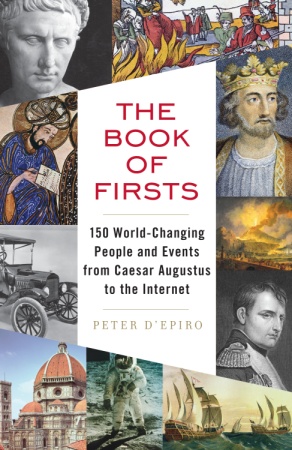The Book of Firsts: A great “firsts” book for history buffs
The next time someone says to you, “I’d like to study history, but I don’t know where to start,” tell them to pick up a copy of The Book of Firsts: 150 World-Changing People and Events from Caesar Augustus to the Internet. Written mostly by Peter D’Epiro, with numerous contributions by eight other scholars, The Book of Firsts covers the last twenty centuries. On average, the authors address seven to eight “firsts” in each century for a total of 150 entries. Each entry’s title is posed as a question, which the entry then answers and discusses in lively detail.
 Lively: that’s the key word – anyone who wants to “study history” runs at some point into the “history is dead (not lively)” problem. For the beginner, the study of history can present significant threshold resistance – until, that is, the would-be history student at last discovers the special field that fires his or her imagination, which allows research – learning about a topic for the love of it – to become possible. Until then, the road to study is littered with corpses (text books) cluttering up the outer, shallower edges of possible topics: very difficult to step across indeed.
Lively: that’s the key word – anyone who wants to “study history” runs at some point into the “history is dead (not lively)” problem. For the beginner, the study of history can present significant threshold resistance – until, that is, the would-be history student at last discovers the special field that fires his or her imagination, which allows research – learning about a topic for the love of it – to become possible. Until then, the road to study is littered with corpses (text books) cluttering up the outer, shallower edges of possible topics: very difficult to step across indeed.
Not so the Book of Firsts, which regales by going very short but fairly deep, chronological only by century but not by a strict time-line or geographic boundary. It thereby entertains the reader while letting her get an idea of where-o-where, across a very broad spectrum of time, she might want, really, to “study history.” Once a topic actually piques her interest, The Book of Firsts gives readers a handy bibliography matched to the questions raised in each of the centuries. In other words, now that you know where to start, you can …well, start!
The prod that sends the student into deeper exploration might be morbid – a detail about one depraved emperor’s murder of his wife (he locked her in the steam bath): has cruelty always ruled the day? – or philosophical (reading a snippet of Li Po’s missive to the “Idlers of the Bamboo Valley”: “When the hunter sets traps only for rabbits, / Tigers and dragons are left uncaught” …true, that) – or political (why the statement “Fuck the Draft” on a t-shirt worn in a courtroom in 1971 became a test-case for the 1791 First Amendment to the US Constitution).
The Book of Firsts starts in the First Century with the entry, “Who was the first Roman emperor?” and moves from there across the globe. But it also ranges into specific subject areas – language, music, science, technology. It ends in the Twentieth Century with the question, “What was the first internet?” Inbetween those two questions, there is definitely an answer for anyone who has ever wondered where to start his or her study of history.
I enjoyed the writing of all the entries (most of which were written by D’Epiro), and I especially liked Nancy Walsh’s essays. And of course I loved Tom Matrullo‘s contributions (which have an astonishing range, from the tenth through the twentieth centuries, with specific stops in the thirteenth, fourteenth, fifteenth, sixteenth, seventeenth, and nineteenth centuries inbetween – wow!). Tom made sure I got a copy of The Book of Firsts, and I thank him for it. No small feat to cover 20 centuries and make it look nearly effortless!
Sounds like a great book! That said, as a history student myself I find it sad that we are constatnly having to create pop history books to get people interested in the subject.
Comment by Thomas — July 27, 2010 #
It’s an amazing big little book (took me forever to read through, actually!). And it’s not pop history so much, since each entry is quite individual, strongly voiced, idiosyncratic (if that’s the right word).
Comment by Yule — July 27, 2010 #